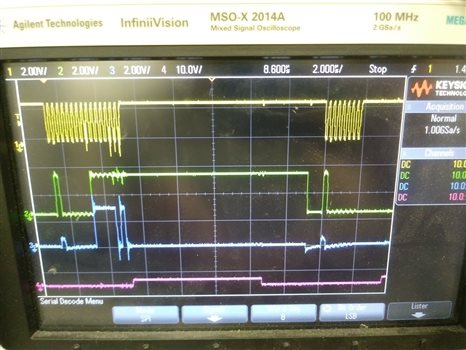SDK v15.2.0 using peripheral spi example. Windows 8.1, uploading to nRF52 DK.
/**
* Copyright (c) 2015 - 2018, Nordic Semiconductor ASA
*
* All rights reserved.
*
* Redistribution and use in source and binary forms, with or without modification,
* are permitted provided that the following conditions are met:
*
* 1. Redistributions of source code must retain the above copyright notice, this
* list of conditions and the following disclaimer.
*
* 2. Redistributions in binary form, except as embedded into a Nordic
* Semiconductor ASA integrated circuit in a product or a software update for
* such product, must reproduce the above copyright notice, this list of
* conditions and the following disclaimer in the documentation and/or other
* materials provided with the distribution.
*
* 3. Neither the name of Nordic Semiconductor ASA nor the names of its
* contributors may be used to endorse or promote products derived from this
* software without specific prior written permission.
*
* 4. This software, with or without modification, must only be used with a
* Nordic Semiconductor ASA integrated circuit.
*
* 5. Any software provided in binary form under this license must not be reverse
* engineered, decompiled, modified and/or disassembled.
*
* THIS SOFTWARE IS PROVIDED BY NORDIC SEMICONDUCTOR ASA "AS IS" AND ANY EXPRESS
* OR IMPLIED WARRANTIES, INCLUDING, BUT NOT LIMITED TO, THE IMPLIED WARRANTIES
* OF MERCHANTABILITY, NONINFRINGEMENT, AND FITNESS FOR A PARTICULAR PURPOSE ARE
* DISCLAIMED. IN NO EVENT SHALL NORDIC SEMICONDUCTOR ASA OR CONTRIBUTORS BE
* LIABLE FOR ANY DIRECT, INDIRECT, INCIDENTAL, SPECIAL, EXEMPLARY, OR
* CONSEQUENTIAL DAMAGES (INCLUDING, BUT NOT LIMITED TO, PROCUREMENT OF SUBSTITUTE
* GOODS OR SERVICES; LOSS OF USE, DATA, OR PROFITS; OR BUSINESS INTERRUPTION)
* HOWEVER CAUSED AND ON ANY THEORY OF LIABILITY, WHETHER IN CONTRACT, STRICT
* LIABILITY, OR TORT (INCLUDING NEGLIGENCE OR OTHERWISE) ARISING IN ANY WAY OUT
* OF THE USE OF THIS SOFTWARE, EVEN IF ADVISED OF THE POSSIBILITY OF SUCH DAMAGE.
*
*/
#include "bma2x2.h"
#include "nrf_drv_spi.h"
#include "app_util_platform.h"
#include "nrf_delay.h"
#include "boards.h"
#include "app_error.h"
#include <string.h>
#include "nrf_log.h"
#include "nrf_log_ctrl.h"
#include "nrf_log_default_backends.h"
#define SPI_INSTANCE 0 /**< SPI instance index. */
static const nrf_drv_spi_t spi = NRF_DRV_SPI_INSTANCE(SPI_INSTANCE); /**< SPI instance. */
static volatile bool spi_xfer_done; /**< Flag used to indicate that SPI instance completed the transfer. */
#define BMA2x2_SPI_BUS_WRITE_CONTROL_BYTE 0x7F
#define BMA2x2_SPI_BUS_READ_CONTROL_BYTE 0x80
#define SPI_BUFFER_LEN 5
static uint8_t m_rx_buf[SPI_BUFFER_LEN]; /**< RX buffer. */
#define BMA_ERROR_CHECK(ERR_CODE) { APP_ERROR_CHECK((ret_code_t) ERR_CODE); }
/**
* @brief SPI user event handler.
* @param event
*/
void spi_event_handler(nrf_drv_spi_evt_t const * p_event,
void * p_context)
{
spi_xfer_done = true;
NRF_LOG_INFO("Transfer completed.");
if (m_rx_buf[0] != 0)
{
NRF_LOG_INFO(" Received: %x", m_rx_buf[0]);
}
}
s8 bma_spi_write(u8 dev_addr, u8 reg_addr, u8 *reg_data, u8 cnt)
{
s8 error = NO_ERROR;
uint8_t tx_buf[cnt+1];
// place write bit + address in first byte
tx_buf[0] = (reg_addr++) & ~BMA2x2_SPI_BUS_WRITE_CONTROL_BYTE;
for (uint8_t string_pos = 1; string_pos < cnt+1; string_pos++)
{
// place data in second byte
tx_buf[string_pos] = *(reg_data + string_pos - 1);
}
spi_xfer_done = false;
error = (s8) nrf_drv_spi_transfer(&spi, tx_buf, cnt+1, NULL, 0);
BMA_ERROR_CHECK(error);
return error;
}
s8 bma_spi_read(u8 dev_addr, u8 reg_addr, u8 *reg_data, u8 cnt)
{
s8 error = NO_ERROR;
uint8_t tx_buf[1] = {reg_addr|BMA2x2_SPI_BUS_READ_CONTROL_BYTE};
spi_xfer_done = false;
error = (s8) nrf_drv_spi_transfer(&spi, tx_buf, 1, reg_data, cnt);
BMA_ERROR_CHECK(error);
return error;
}
void spi_delay(u32 millis_time)
{
nrf_delay_ms(millis_time);
}
int main(void)
{
APP_ERROR_CHECK(NRF_LOG_INIT(NULL));
NRF_LOG_DEFAULT_BACKENDS_INIT();
nrf_drv_spi_config_t spi_config = NRF_DRV_SPI_DEFAULT_CONFIG;
spi_config.ss_pin = SPI_SS_PIN; //29 -> 17
spi_config.miso_pin = SPI_MISO_PIN; //28 -> 8
spi_config.mosi_pin = SPI_MOSI_PIN; //4 -> 6
spi_config.sck_pin = SPI_SCK_PIN; //3 -> 15
spi_config.mode = NRF_DRV_SPI_MODE_3;
spi_config.bit_order = NRF_SPI_BIT_ORDER_MSB_FIRST;
APP_ERROR_CHECK(nrf_drv_spi_init(&spi, &spi_config, spi_event_handler, NULL));
NRF_LOG_INFO("SPI hardware initialised.");
struct bma2x2_t bma2x2;
bma2x2.chip_id = BMA2x2_INIT_VALUE;
bma2x2.bus_write = &bma_spi_write;
bma2x2.bus_read = &bma_spi_read;
bma2x2.dev_addr = 102; // Random value. No chip select mechanism in place
bma2x2.delay_msec = &spi_delay;
BMA_ERROR_CHECK(bma2x2_init(&bma2x2));
if (bma2x2.chip_id == 0xFD)
{
NRF_LOG_INFO("BMA API initialised.");
}
else
{
NRF_LOG_INFO("BMA chip id: %x", bma2x2.chip_id);
}
while (1)
{
u8 m_rx[1] = {0xFF};
bma_spi_read(0, 0, m_rx, sizeof(m_rx));
NRF_LOG_INFO("m_rx: %x", m_rx[0]);
nrf_delay_us(2);
bma_spi_read(0, 0, m_rx, sizeof(m_rx));
NRF_LOG_INFO("m_rx_2: %x", m_rx[0]);
while (!spi_xfer_done)
{
__WFE();
}
NRF_LOG_FLUSH();
nrf_delay_ms(1000);
}
}
In my while loop I use bma_spi_read() twice with a small delay in between. The first call includes 16 clock pulses as expected but the second only includes 8. I do not know why.


